Category: Latest News 2024
HONORING EXCELLENCE: Proclamations Recognize Key Miami Beach Business Contributors (Event Recap)
On November 13, the Miami Beach Commission proudly recognized two outstanding organizations that significantly contribute to our city's cultural and economic landscape. These proclamations celebrate their continued commitment to making Miami Beach a thriving, interconnected community.
Miami Beach Visitor and Convention Authority (MBVCA)
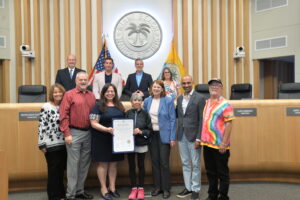 The MBVCA received a Certificate of Recognition for its steadfast dedication to promoting Miami Beach as a premier global destination. Since its establishment in 1967, MBVCA has bolstered our city’s reputation by supporting renowned events such as Art Basel, South Beach Wine and Food Festival, and Miami Beach Pride. These events not only enhance our cultural vitality but also generate significant economic activity.
The MBVCA received a Certificate of Recognition for its steadfast dedication to promoting Miami Beach as a premier global destination. Since its establishment in 1967, MBVCA has bolstered our city’s reputation by supporting renowned events such as Art Basel, South Beach Wine and Food Festival, and Miami Beach Pride. These events not only enhance our cultural vitality but also generate significant economic activity.
Additionally, the MBVCA's recent accolades, including two Magellan Awards for hospitality innovation, highlight its success in leveraging technology and marketing. The EXP Miami Beach Tours App, which enhances visitor planning through dynamic content, exemplifies their forward-thinking approach. Their ongoing efforts ensure Miami Beach remains a vibrant, top-tier destination for tourists worldwide.
The Setai Hotel
Celebrating nearly two decades in Miami Beach, The Setai Hotel earned recognition for its exemplary commitment to community service. Beyond providing luxury accommodations, The Setai actively addresses pressing social issues by partnering with organizations like Feeding South Florida and Lotus House. Their initiatives combat hunger, homelessness, and economic disparity, fostering meaningful change in the community.
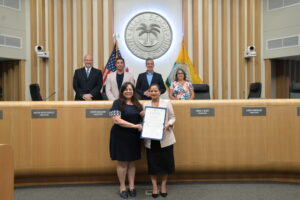 Moreover, The Setai's emphasis on diversity and inclusion has garnered prestigious accolades, including a Diversity Award from the Greater Miami and the Beaches Hotel Association. With a workforce representing over 30 countries, they champion a workplace that embraces unity and mutual respect.
Moreover, The Setai's emphasis on diversity and inclusion has garnered prestigious accolades, including a Diversity Award from the Greater Miami and the Beaches Hotel Association. With a workforce representing over 30 countries, they champion a workplace that embraces unity and mutual respect.
As The Setai prepares to celebrate its 20th anniversary, its philanthropic efforts and mission to blend luxury with responsibility continue to inspire.
A Thriving Miami Beach Community
These organizations exemplify the values that make Miami Beach an extraordinary place to live, work, and visit. By promoting tourism and community engagement, they enrich our local economy and strengthen our city’s global appeal. Miami Beach is proud to celebrate their achievements and contributions to our community.
Miami Beach Donates Ambulance to Sister City Nahariya (Event Recap)
This Fall, the City of Miami Beach relaunched the Miami Beach Sister Cities Committee with a purpose to promote peace, understanding, and goodwill through cultural, educational, technical, environmental, and economic exchanges between cities in different countries. Miami Beach started the Sister Cities Program in 1959 and has created long-term partnership that involve people and organized groups at all levels of society. Sister Cities programs encourage citizens to better understand other cultures and communities by learning and supporting trade, democratization, sustainability, and more.
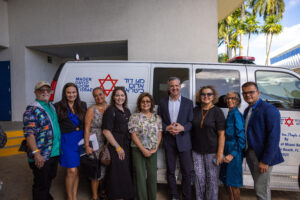 On November 14, 2024, the City of Miami Beach presented a fully equipped ambulance to Sister City, Nahariya, Israel. The donation, organized through the Miami Beach Sister Cities Committee and Magen David Adom, a volunteer non-profit organization that provides disaster, ambulance and blood service in Israel, aims to support emergency response efforts in Nahariya, which has been impacted by recent conflicts.
On November 14, 2024, the City of Miami Beach presented a fully equipped ambulance to Sister City, Nahariya, Israel. The donation, organized through the Miami Beach Sister Cities Committee and Magen David Adom, a volunteer non-profit organization that provides disaster, ambulance and blood service in Israel, aims to support emergency response efforts in Nahariya, which has been impacted by recent conflicts.
This Month in Miami Beach History:
Miami Beach's First Trolley: Connecting Communities Since 1920
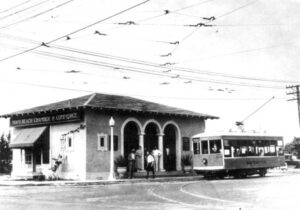
December 8, 1920, marked a transformative moment for Miami Beach as the city’s first electric trolley system began operation. This pioneering transit network not only connected Miami Beach to Miami but also established 13 local stops within the island itself. For a young and growing city, the trolley was more than just a mode of transportation—it was a gateway to opportunity, facilitating commerce, tourism, and community-building.
The introduction of the electric trolley system was part of Miami Beach’s broader efforts to position itself as a modern, accessible destination. As detailed in historical records, including the Florida State Archives, the trolley was a marvel of its time. It allowed residents and visitors to seamlessly traverse the bay, enhancing daily life and making the beach more accessible to those in Miami proper.
By the early 1920s, Miami Beach was quickly becoming a hub for leisure and business, and the trolley played a vital role in this transformation. The 1921 photo of a bustling Miami Beach trolley stop captures the vibrant energy of a city on the rise. Visitors and locals alike depended on this reliable system to reach homes, businesses, and beachside attractions, laying the foundation for the area’s reputation as a world-class destination.
The trolley wasn’t just a symbol of progress; it was a literal bridge between the island and mainland, uniting two communities and spurring Miami Beach’s development as we know it today. This pivotal innovation reminds us of the power of connectivity, a legacy that continues to shape the city’s transportation infrastructure a century later.
BPN SUMMIT 2024: A Celebration of Legacy and Empowerment (Event Recap)
 Discover how legacy building, wealth creation, and community impact intertwined at the Black Professionals Network 2024 Summit! Sponsored by the Miami Beach Economic Development Department, this transformative event engaged over 500 Black professionals and entrepreneurs at the "LegacyCon: House of Heroes" conference. From inspiring keynotes by industry trailblazers like Fawn Weaver to dynamic panel discussions, the summit was a hub of empowerment and actionable insights.
Discover how legacy building, wealth creation, and community impact intertwined at the Black Professionals Network 2024 Summit! Sponsored by the Miami Beach Economic Development Department, this transformative event engaged over 500 Black professionals and entrepreneurs at the "LegacyCon: House of Heroes" conference. From inspiring keynotes by industry trailblazers like Fawn Weaver to dynamic panel discussions, the summit was a hub of empowerment and actionable insights.
Miami Beach Sponsors and Engages at 10th Annual Black Professionals Network Summit
Miami Beach proudly sponsored and participated in the 10th Annual Black Professionals Network (BPN) Summit, held on December 22, 2024, at the Seminole Hard Rock Hotel & Casino. The event, themed “LegacyCon: House of Heroes”, gathered Black professionals, entrepreneurs, and thought leaders uniting them by a common vision: build lasting legacies through financial success, personal development, and community impact.
A Celebration of Legacy and Empowerment

The three-day summit provided a dynamic platform, for over 500 attendees, to gain insights, network, and reflect on their professional journeys. The event featured keynote speeches, panel discussions, workshops, and interactive sessions designed to empower professionals and foster community engagement.
Inspiring Keynote by Fawn Weaver
A highlight of the summit was the keynote speaker Fawn Weaver, co-founder of Uncle Nearest Premium Whiskey and two-time New York Times bestselling author. Weaver shared her remarkable journey of resilience, entrepreneurship, and legacy-building. She spoke about her mission to honor Nathan “Nearest” Green, a formerly enslaved man who taught Jack Daniel the art of distilling, thereby reshaping the whiskey industry by bringing his story to light.

Weaver emphasized the power of storytelling in business and the importance of ownership in building generational wealth. "You can’t compete with marketing dollars, but you can dominate with earned media," she explained, highlighting how she leveraged press coverage to build the Uncle Nearest brand. Her story resonated deeply with the audience as she shared personal experiences of overcoming challenges, including dropping out of high school at 15 and experiencing homelessness.
Empowering Panel Discussions and Workshops
The summit featured a variety of panel discussions and workshops covering topics such as entrepreneurship, wealth building, leadership development, and leveraging technology for business growth.

Miami Beach participated in a panel titled "Operation Opportunity: Powering Progress through Partnerships", which included leaders from government agencies, economic development advocates, and procurement officers to highlight business opportunities available to potential vendors and partners. Veronica Hennig, Senior Redevelopment Specialist from the Miami Beach Economic Development Department, shared information about grants, incentives, and programs designed to attract and support businesses.
"Success in entrepreneurship is deeply rooted in the relationships we build with our communities and government entities," said Ms. Hennig. "Our programs are not just about financial support; they are creating a collaborative environment where businesses and the community grow together."
The summit served as a valuable platform for sharing knowledge, inspiring action, and building connections that will drive economic empowerment. The department remains committed to supporting entrepreneurs and businesses as they navigate opportunities for growth in Miami Beach.
Get Involved with Miami Beach Economic Development
Businesses and entrepreneurs interested in learning more about the city's programs and opportunities are encouraged to contact the Economic Development Department. Resources offered include:
- Grants and Incentives: Financial programs designed to support business attraction, expansion, and retention.
- Business Support Services: Guidance on navigating regulatory processes, accessing local resources, and connecting with key stakeholders.
- Community Engagement Opportunities: Initiatives that foster collaboration between businesses, community organizations, and government entities.
Together, We Can Fuel Growth
We invite you to join us in building a prosperous future for the Miami Beach community. For more information, please visit our www.mbbiz.com.
STRIVE305 Small Business Saturday Empowers Local Entrepreneurs
with RISE Loan Program Insights
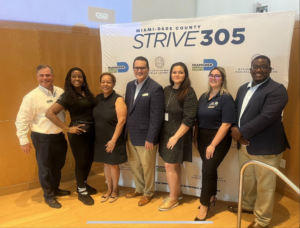 On October 19, 2024, Miami Beach and Miami-Dade County STRIVE305 initiative hosted a Small Business Saturday event at the Miami Beach Regional Library. The theme of the event was financial empowerment for local entrepreneurs, and focused supporting small businesses and fostering a thriving local economy.
On October 19, 2024, Miami Beach and Miami-Dade County STRIVE305 initiative hosted a Small Business Saturday event at the Miami Beach Regional Library. The theme of the event was financial empowerment for local entrepreneurs, and focused supporting small businesses and fostering a thriving local economy.
The keynote speaker was George Joseph, President and CEO of the Dade County Federal Credit Union. Mr. Joseph presented the RISE (Re-Investing in our Small Business Economy) Miam-Dade Fund (“Rise Program”). The RISE Program consists of affordable, flexible financing accessible loans (up to $75,000) created for local Miami-Dade small businesses, particularly businesses who have experienced difficulty securing conventional loans. The RISE Program provides critical financial support, enabling business owners to invest in equipment, hire employees, and cover operating costs. The Rise Program's low-interest, flexible options empower businesses to grow, create jobs, and reinvest within their local communities.
The City of Miami Beach and Miami-Dade County partnership highlights a strategic effort to break down financial barriers and support sustainable small business growth. By offering entrepreneurs practical financial solutions through the RISE loan program, the event equipped attendees with resources to secure a more stable financial future and build resilience in today’s competitive market.
The event was the first of a series under the STRIVE305 initiative, aimed at driving economic development and providing business owners with actionable tools. For more information on the RISE Program and to explore how it can support your business goals, visit dcfcu.org/rise. The next STRIVE305 Small Business Saturday event will be held on November 9, 2024 in Coral Gables at Books & Books.
This Month in Miami Beach History:
Miami Beach Botanical Garden’s Renewal – A November Transformation

In November 2011, the Miami Beach Botanical Garden reopened its gates to the public after a significant renovation that transformed it into a lush, sustainable oasis in the heart of the city. Originally established in 1962, the garden had served as a green space for decades, but its redesign brought fresh life and purpose to the area. Landscape architect Raymond Jungles led this revitalization, incorporating native Florida plants, water-conserving features, and a layout that encourages visitors to experience Miami Beach’s unique natural beauty up close.
As we mark this November milestone, we celebrate the garden’s evolution from a modest public space into an essential part of Miami Beach’s identity. Now a beloved spot for residents and tourists alike, the Miami Beach Botanical Garden serves not only as a space for relaxation and recreation but as a center for environmental education, cultural events, and community connection.
1. A Green Renewal with Environmental Impact
The garden’s redesign was driven by a vision to create a sustainable landscape that would thrive in Miami Beach’s subtropical climate. Raymond Jungles’s approach emphasized native plants, drought-resistant vegetation, and the use of natural materials to minimize environmental impact. The garden’s water features, shaded walkways, and native flora all contribute to an eco-friendly design that conserves water, provides habitats for local wildlife, and encourages sustainable practices.
This focus on sustainability reflects Miami Beach’s commitment to green initiatives, reinforcing the city’s appeal to environmentally conscious residents and businesses. Today, the garden stands as a model for eco-friendly urban spaces, inspiring visitors and local enterprises to adopt green practices.
2. A Hub for Community and Cultural Events
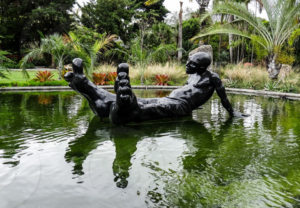 Since its reopening, the Miami Beach Botanical Garden has become a vibrant hub for cultural and community activities. It regularly hosts art exhibitions, workshops, and public gatherings, drawing both locals and visitors. From yoga sessions to plant markets and educational programs, the garden offers diverse programming that caters to a wide range of interests. This approach aligns with Miami Beach’s vision of creating inclusive spaces that enhance community engagement and cultural appreciation.
Since its reopening, the Miami Beach Botanical Garden has become a vibrant hub for cultural and community activities. It regularly hosts art exhibitions, workshops, and public gatherings, drawing both locals and visitors. From yoga sessions to plant markets and educational programs, the garden offers diverse programming that caters to a wide range of interests. This approach aligns with Miami Beach’s vision of creating inclusive spaces that enhance community engagement and cultural appreciation.
For local businesses, the garden’s events attract new audiences, increasing foot traffic in the area and providing opportunities for partnerships. Businesses in the hospitality and retail sectors, in particular, benefit from the steady stream of visitors seeking unique experiences within the city.
3. An Educational Resource for Sustainable Living
The garden’s educational initiatives are a cornerstone of its mission. It provides interactive programs on sustainable gardening, native plant species, and environmental conservation, making it an invaluable resource for students, families, and eco-conscious visitors. The garden’s layout itself serves as a living classroom, showcasing plants that flourish in Miami Beach’s climate and promoting biodiversity.
Local schools and organizations frequently collaborate with the garden to offer hands-on learning experiences, reinforcing Miami Beach’s role as a community committed to environmental education. This outreach effort contributes to a growing awareness of ecological issues and sustainable practices within the Miami Beach community.
The November 2011 reopening of the Miami Beach Botanical Garden represents more than just a physical transformation; it symbolizes Miami Beach’s dedication to preserving green spaces, promoting environmental education, and fostering a community-centered approach to city planning. As the garden continues to bloom, it reminds us that investments in sustainable design and public spaces yield lasting benefits, strengthening Miami Beach’s identity as a forward-thinking, eco-conscious city.
This Month in Miami Beach History: The Opening of the Fontainebleau Hotel
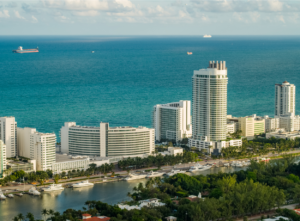
On October 20, 1954, the Fontainebleau Hotel opened its doors, marking a pivotal moment in Miami Beach’s transformation into a global hub of luxury, culture, and business. With its striking design by Morris Lapidus, the Fontainebleau quickly became a magnet for the world’s elite, setting the stage for Miami Beach’s rise as an iconic destination.
For the business community, the Fontainebleau wasn’t just a hotel—it was an economic engine. Its allure brought a steady stream of affluent tourists and high-profile events, helping to ignite Miami Beach’s hospitality, retail, and entertainment sectors. As one of the most sought-after venues for conferences, conventions, and international gatherings, the Fontainebleau remains integral to the city’s economy today, driving year-round business activity and supporting local restaurants, boutiques, and cultural institutions. This legendary hotel stands as a beacon of Miami Beach’s evolution, symbolizing the intersection of innovation, luxury, and opportunity that continues to fuel the city’s business landscape.
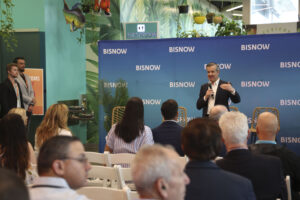 The Future of the Miami Beaches event by Bisnow, held at the Lincoln Road Eatery, saw the City of Miami Beach take a leading role as a sponsor, reinforcing its commitment to transforming the city’s economic landscape. With a focus on attracting businesses in key sectors like health, tech, finance, and the arts, the event highlighted the city’s strategic push towards creating a vibrant, multifaceted business environment that balances innovation, commerce, and culture.
The Future of the Miami Beaches event by Bisnow, held at the Lincoln Road Eatery, saw the City of Miami Beach take a leading role as a sponsor, reinforcing its commitment to transforming the city’s economic landscape. With a focus on attracting businesses in key sectors like health, tech, finance, and the arts, the event highlighted the city’s strategic push towards creating a vibrant, multifaceted business environment that balances innovation, commerce, and culture.
Mayor Steven Meiner opened the event with powerful keynote remarks, emphasizing the city’s pivot away from its former party-centric image toward becoming a destination that fosters sustainable growth and attracts businesses that value the city’s unique live-work-play balance. He underscored the city’s commitment to fostering a business-friendly climate while retaining the cultural vibrancy that has long made Miami Beach iconic.
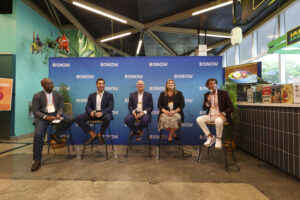 A standout moment during the event was the Retail Renaissance: The Future of Beachfront Commerce panel, where Commissioner Joe Magazine shared exciting news that Edglrd, a creative company, is in the process of moving its headquarters to Lincoln Road. This move is a clear signal of Miami Beach’s evolution into a hub for innovative and creative industries. Magazine further highlighted that collaboration between the city and businesses is essential for long-term, sustainable economic growth.
A standout moment during the event was the Retail Renaissance: The Future of Beachfront Commerce panel, where Commissioner Joe Magazine shared exciting news that Edglrd, a creative company, is in the process of moving its headquarters to Lincoln Road. This move is a clear signal of Miami Beach’s evolution into a hub for innovative and creative industries. Magazine further highlighted that collaboration between the city and businesses is essential for long-term, sustainable economic growth.
Lincoln Road, once known primarily for retail and dining, is undergoing a transformation into a space where creativity and commerce intersect. By attracting companies like Edglrd, the city is positioning itself as a destination for forward-thinking businesses that value not just location but a holistic lifestyle experience that includes work, culture, and leisure.
The event showcased Miami Beach’s efforts to adapt to changing consumer behaviors, technological advancements, and the ongoing need for sustainability. Discussions ranged from the latest retail trends and hospitality innovations to beachfront development strategies and climate resilience. With luxury retailers, creative firms, and other key players gravitating toward the area, Miami Beach is setting a new standard for economic diversity and community engagement.
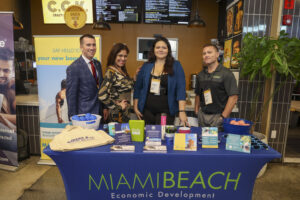 The City of Miami Beach’s Economic Development Department continues to play a critical role in driving this transformation by cultivating a business ecosystem that thrives on innovation and resilience. As the city evolves into a hub for industries like health, tech, finance, and the arts, it remains committed to creating opportunities for growth, collaboration, and cultural integration. Events like The Future of the Miami Beaches highlight the city’s proactive approach in shaping a dynamic future, making Miami Beach a premier destination for business and lifestyle.
The City of Miami Beach’s Economic Development Department continues to play a critical role in driving this transformation by cultivating a business ecosystem that thrives on innovation and resilience. As the city evolves into a hub for industries like health, tech, finance, and the arts, it remains committed to creating opportunities for growth, collaboration, and cultural integration. Events like The Future of the Miami Beaches highlight the city’s proactive approach in shaping a dynamic future, making Miami Beach a premier destination for business and lifestyle.
On the Road to Preparedness

Disasters impact the workplace — beyond physical damage, they affect both the people who work there as well as business operations. After a disaster, workplaces cannot recover without their people and people cannot recover without a job to go back to.
When it comes to preparing for a disaster, your organization can have influence over employee behavior in important ways. For example, when employees are encouraged by their employers to be prepared for disasters, employees are 75 percent more likely to take action. And with more than 63 percent of the U.S. population aged 16 or older in the labor force, the workplace is one of the most effective environments for educating and encouraging people to take steps to be ready for disasters. Businesses that plan ahead are more prepared, more resilient, and more important, can avoid becoming a statistic. According to FEMA, 40% of businesses never recover after a disaster and 62% of business owners do not have an emergency plan in place. A resilient business is one that can quickly and effectively address adversity. Resilient businesses experience fewer or shorter disruptions caused by a disaster, can resume regular operations sooner, recover faster, and adjust for the future.
September is National Preparedness Month. Take the time to evaluate your preparedness levels, update your emergency plans, and equip yourself with the necessary tools and knowledge to face adversity. To get your business started on the road to resiliency, FEMA offers excellent resources literally available at your fingertips at Ready.gov/business. There you will find hazard specific Ready Business Toolkits, Ready Business Plans, Trainings and Exercises, as well as other business resources.
Another excellent way to be prepared is to organize a Business Emergency Response Team (BERT). A BERT program can support and enhance existing capabilities, and BERT employees/volunteers can participate in efforts to increase the preparedness and resilience of the workplace and community. A Workplace BERT program equips employees with skills that enable them to perform basic disaster response operations in an emergency. Having trained staff volunteers available helps protect the health and safety of people at your workplace.
Workplace BERT employees are trained using the Community Emergency Response Team (CERT) Basic Training curriculum. The 24-hour FEMA-approved training covers Disaster Preparedness, Emergency Response Team Organization, Disaster Medical Operations, Stop-the-Bleed, Disaster Psychology, Fire Safety and Utility Controls, Light Search and Rescue Operations and response to Terrorism.
To prepare your employees, the City of Miami Beach Division of Emergency Management offers the CERT/BERT training curriculum. Employers and employees can register for the training by going to the Miami Beach CERT website and selecting which set of trainings that will work with their schedule. Emergency Management can also work with your business to plan your own set of trainings. If you have questions, please feel free to email CERT@miamibeachfl.gov or call 305.673.7736.
 The Business Concierge and Licensing Day event on August 15 was a resounding success, bringing together a diverse group of entrepreneurs, business owners, and community leaders in Miami Beach. Held at City Hall, the event provided a streamlined, one-stop experience for local businesses to obtain or renew their licenses and tax receipts, simplifying what is often a complex process.
The Business Concierge and Licensing Day event on August 15 was a resounding success, bringing together a diverse group of entrepreneurs, business owners, and community leaders in Miami Beach. Held at City Hall, the event provided a streamlined, one-stop experience for local businesses to obtain or renew their licenses and tax receipts, simplifying what is often a complex process.
Attendees were guided through licensing procedures by knowledgeable city staff, who provided valuable resources and answered questions to ensure compliance with local regulations. The event made it easier for both new and established businesses to efficiently meet their obligations.
The event featured active participation from various city and county departments, each offering expertise to enhance the attendee experience. The Miami Beach Planning and Zoning Department provided guidance on zoning regulations, while the Building Department offered insights on permit requirements. The Customer Service/Finance Department managed business tax receipts and other essential documentation.
Additionally, the Miami Beach Procurement Department enrolled businesses as city vendors, creating new opportunities for local companies to engage in city projects. The City of Miami Beach Economic Development Department shared information about the city’s business support services and programs designed to help businesses succeed.
On the county side, the Miami-Dade County Tax Collector’s Office clarified tax obligations, and the Miami-Dade Department of Environmental Resources Management (DERM) addressed environmental regulations. The County Office of Innovation and Economic Development, the Small Business Division, and the Miami-Dade Economic Advocacy Trust (MDEAT) also offered support and resources to help small businesses grow.
This collaborative effort between city and county departments ensured comprehensive support for business owners, making the licensing process more accessible. The event underscored Miami Beach’s commitment to fostering a thriving business environment by providing the necessary resources for compliance and growth.


 83°
83° 